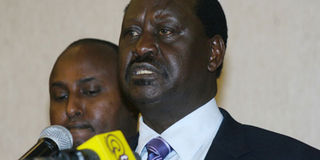Cord leader Raila Odinga urges Govt to review VAT law

Former Prime Minister Raila Odinga (right) flanked by Suna East MP Junet Mohamed addresses a press conference at the Serena Hotel, Nairobi September 4, 2013. He urged the government to rethink the implementation of the Value Added Tax law to check the high cost of living. JENNIFER MUIRURI
What you need to know:
Cord wants the government to cut down on its public expenditure and expand its tax base as some of the measures to reduce the tax burden on Kenyans.
The Coalition for Reforms and Democracy has urged the government to rethink the implementation of the Value Added Tax law to check the high cost of living.
Instead, Cord wants the government to cut down on its public expenditure and expand its tax base as some of the measures to reduce the tax burden on Kenyans.
Former Prime Minister Raila Odinga said it was unfair for the Jubilee government to include VAT on goods that have traditionally been exempt, at a time when the economy was "depressed and underperforming".
He described the introduction of the tax as ‘the most cruel way for a government to raise money’ in such a depressed economy.
“VAT is basically an attack on consumption trends and habits. In fact, with the depression our economy is going through, this is the time they should lower VAT from 16 to 14 per cent to encourage spending,” Mr Odinga said during a news conference at Serena Hotel, Nairobi Wednesday.
“If the government wants to raise revenue, there are better and less painful ways of doing so without making taxation a burden,” he said.
The Cord leader, who was accompanied by MPs Junet Mohammed and Manson Nyamweya said: “We fear that the increase in VAT may lead to failure by the government to meet its target in revenue as people cut down on consumption because they cannot afford".
CHAIN REACTION
Kenyans have been hit by a wave of price increases as the Value Added Tax (VAT) Act, 2013, came into effect, forcing manufacturers and traders to add the 16 per cent charge on the prices of goods.
Mr Odinga said the tax would lead to a chain reaction in price increases.
“There is no doubt that the cost of transport will go up, farm inputs will increase and those who offer services to make the economy run put up their costs as well,” he said.
"Soon, schools will raise their fees because of the growing cost of food and other consumables, students in colleges will be asking for increased allowances for those on Helb loans to be able to afford life,” said the former PM.
He said the new law will hit the ICT sector, which contributed five per cent of the country’s GDP in 2011-2012, hard with prices of phones and talk time going up.
CHANGE OF HEART
He noted that during his 2009 budget speech, President Kenyatta, as the finance minister proposed to exempt from VAT, all telephone sets, as they had become an essential aspect of Kenyan’s daily communication.
“We challenge the President to explain this change of heart,” said the former PM.
Mr Odinga also criticised the move by banks to charge Kenyans a 10 per cent tax each time they withdraw money from their accounts or make transfers in any form.
This, he said, had also pushed the cost of withdrawals up, as banks and other financial agencies pass the cost directly to consumers of their services.
“We will see a situation where Kenyans may be forced to withdraw and keep money under their mattresses,” he said.





